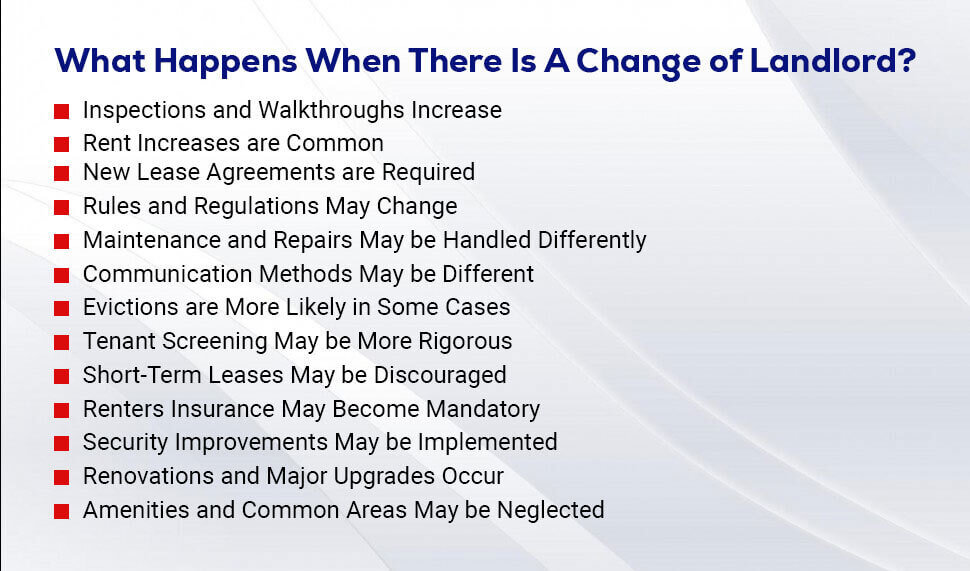Getting a new landlord can be an uncertain and stressful time for tenants. You likely have a lot of questions about how this will impact your rental, from rent increases to changes in policies and procedures. In this article, we break down everything you need to know about what happens when a new landlord takes over. Let’s dive in.
Reasons Behind The Change In Landlordship

Selling of Property: One of the most common reasons for a change in landlords is the sale of the rental property. The current landlord can sell out the property due to retirement, financial needs, or other personal reasons, leading to a change of ownership of the rental property. This change can impact the existing tenant’s lease and terms.
Foreclosure: If the landlord has taken mortgage loans from financial institutions or other lenders and failed to make those payments, then the lenders can have foreclosed on the property and become the new landlord. They would then look out to sell it to a new owner. Existing tenants can have certain rights during this process.
Death of Landlord: Death is a natural event for everyone. When the existing landlord passes away, the ownership will pass on to his/her heirs, becoming a new owner of the rental property. Change of ownership can also happen in cases of wills and trusts.
Management Company Change: The owner of the property may have switched management companies that oversee the property and interact with tenants. The new property management company acts on behalf of the landlord.
Corporate Ownership: In some cases, rental properties are owned by corporations or real estate investment companies. Changes in the ownership or management of these entities can result in new landlords overseeing the property.
Partnership Dissolution: If a property is jointly owned by multiple individuals or partners, a change in landlords can occur due to the dissolution of the partnership. This can happen when partners decide to go their separate ways or when disagreements cannot be resolved.
Legal Proceedings: In some cases, legal proceedings, such as eminent domain, can result in new property management. In eminent domain, the government acquires private property for public use after compensating the owner fairly.
What Happens When There Is A Change of Landlord?

Inspections and Walkthroughs Increase
One of the first things new landlords often do is perform thorough inspections and walkthroughs of their newly acquired properties. They want to get a complete assessment of the condition of each unit and identify any maintenance issues that need addressing. This means tenants may receive notification that the new owner and/or a maintenance crew will be entering their unit to document its current state. Some landlords hire professional inspectors to create detailed reports. They may even request access to spaces like storage closets and under sinks that previous landlords didn’t examine.
While this can feel invasive, it’s generally in the tenants’ best interest to be cooperative. Complying with inspection requests and pointing out any damaged or malfunctioning appliances provides an opportunity to get repairs completed. However, make sure to be present during the inspection to ensure accuracy and fairness.
Rent Increases are Common
Perhaps one of the biggest concerns for tenants is that a new landlord will raise rents, especially in competitive rental markets. Many landlords want to increase profit margins and will use the transition period to institute rent hikes. The amount varies greatly, but it’s not uncommon for rents to go up 5-10% with a new owner. Month-to-month tenants usually face the biggest risk of a sudden increase.
In some areas, there are limits on how much landlords can raise rents each year. Research local tenant rights laws to see if there are protections in place. If the increase seems unreasonable, negotiate with the landlord to phase it in over multiple years. If that fails, tenants may have to make the difficult choice of paying more or looking for a new home.
New Lease Agreements are Required
Existing lease agreements are generally transferred over to a new landlord when a property changes hands. However, once current leases expire, landlords frequently want to draft updated contracts. This allows them to outline policies, fees, and procedures they want in place going forward.
Tenants should carefully review new lease agreements and negotiate any problematic terms. Key things to look for include the length of the lease, rent increase clauses, maintenance responsibilities, and fees for breaking the lease or paying rent late. Having an open conversation with the new management can help smooth the transition to a new contract.
Rules and Regulations May Change
Landlords often have their own style when it comes to rules and regulations for their properties. When a new owner takes over, tenants may suddenly find themselves facing new restrictions, protocols, and fees. This can include changes to things like noise levels, trash policies, parking arrangements, pets, and more.
While tenants don’t have to automatically comply with new rules, they should review them carefully rather than ignoring them altogether. Situations that significantly impact quality of life or finances may require further discussion and negotiation. Tenants who refuse to adhere to reasonable new guidelines may face consequences like fines or even eviction.
Maintenance and Repairs May be Handled Differently
One of the most important landlord duties is properly maintaining rental units and completing repairs promptly. When a new landlord takes over, tenants often find the maintenance process functions quite differently. Some landlords outsource all work to professional contractors, while others have in-house maintenance staff.
The repair request process may move online rather than calling the landlord directly. Response times could improve or worsen under new management. Tenants should find out the protocol for maintenance under the new owner and clarify an expected timeline for completing repairs. If basic maintenance needs are neglected, tenants have legal recourse in most areas.
Communication Methods May be Different
Developing a cooperative relationship with a landlord relies heavily on open communication. Tenants who get a new landlord should expect that communication methods and responsiveness could be quite different. Some landlords prefer phone calls, emails, text messages, or tenant portals.
The previous owner may have been on-site frequently while the new landlord is remote. Response times to questions and concerns may improve or worsen. Tenants should inquire about the preferred way to contact the new management team and clarify standards for response time. Clear ongoing communication from the start helps tenant-landlord relationships thrive.
Evictions are More Likely in Some Cases
Unfortunately, it’s not uncommon for new landlords to be more aggressive about evicting problem tenants. Long-term renters who consistently paid rent late or violated rules under the old owner may find their transgressions no longer tolerated. New owners are less invested in existing tenants and more concerned about maximizing profits.
Tenants with a history of late payments or conflicts with past management should be proactive about remedying concerns when a new landlord takes over. It’s wise to start with a clean slate by paying rent early, complying with rules, and addressing any lingering issues. If problems persist, landlords may pursue eviction for several valid reasons, making it even more important for tenants to stay ahead of potential problems.
Tenant Screening May be More Rigorous
Landlords acquire rental properties as investments and want to maximize revenue. Many seek to do this by limiting perceived risks, including being more selective about approving new tenants. As a result, applicant screening processes often become more rigorous under new ownership.
Prospective tenants may encounter detailed application forms, higher income requirements, full credit checks, background screens, and elevated security deposits. Current tenants who renew leases will likely face some increased scrutiny as well. While this can be frustrating, it’s within a landlord’s rights to be selective.
Recommended Article: How to pass a rental credit check?
Short-term Leases May be Discouraged
Landlords often prefer long-term tenants who renew leases year after year. Shorter leases of just 6-12 months are riskier for owners and limit potential rental income. As a result, new landlords sometimes institute policies that discourage short-term leasing.
This can include larger rent increases for short-term renewals, mandatory lease terms of 1-2 years, or not offering short-term leasing at all. Existing tenants on month-to-month leases may be pushed to sign longer agreements or face displacement.
Renters Insurance May Become Mandatory
Requiring tenants to carry renters insurance is a trend many new landlords follow. They institute policies making it mandatory for all renters to have active policies. This protects landlords from liability for tenant property losses.
If renters insurance becomes a requirement, tenants must obtain a policy from an insurer that meets minimum coverage levels, typically $100,000. Landlords may request proof of coverage. While an added expense, renters insurance provides valuable protection.
Related article: Does Renters Insurance Cover Displacement?
Security Improvements May be Implemented
Ensuring properties are safe and secure is a high priority for most landlords. When new owners take over, they often look to improve security measures by adding features like new locks, lighting, cameras, gates, and patrols.
While intrusive for some, most tenants appreciate steps taken to enhance safety at their rentals. Cooperating with new security protocols helps maintain positive relationships with landlords focused on protection.
Renovations and Major Upgrades Occur
Some new landlords come in with big plans to renovate and upgrade their newly acquired properties. This may involve electrical and plumbing overhauls, new roofs, structural improvements, replacing appliances and fixtures, or modernization.
Major renovations address deferred maintenance and improve living conditions for tenants. However, they also often lead to rent increases. Tenants may have to temporarily relocate during renovations as well. Clear communication about timelines and allowances can ease the hassle.
Related Article: What is a Tenant Improvement?
Amenities and Common Areas May be Neglected
Some landlords focus more on maximizing profits than properly maintaining their properties. As a result, amenities and common areas may suffer from neglect under new ownership.
Tenants should monitor shared spaces and report any apparent decline in maintenance. Persistent issues may signal bigger problems with the landlord’s financial health or competence. Don’t wait until it’s too late to address deficiencies.
Conclusion
Transitioning to a new landlord might initially raise some questions, but with clear communication and mutual understanding, the shift can proceed smoothly. Make sure to familiarize yourself with the policies of the new landlord and keep channels of communication open. This way, you can guarantee a positive tenant experience under the new management.
Rent anytime. Move anytime.

Author
Scott Nachatilo is an investor, property manager and owner of OKC Home Realty Services – one of the best property management companies in Oklahoma City. His mission is to help landlords and real estate investors to manage their property in Oklahoma.
 (
(









